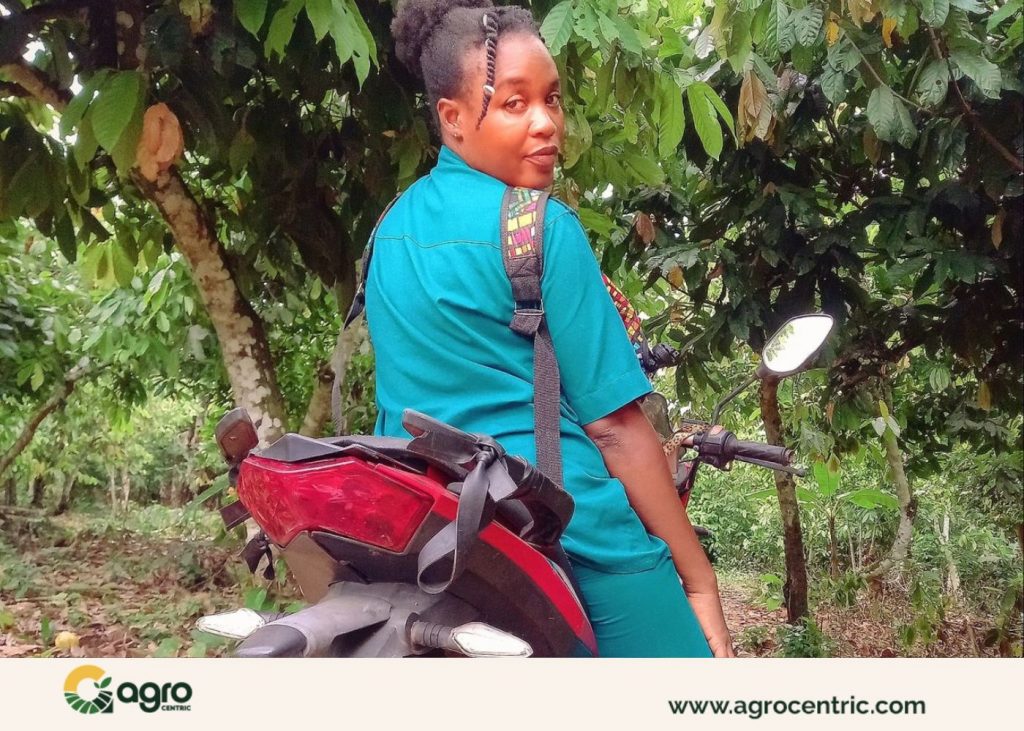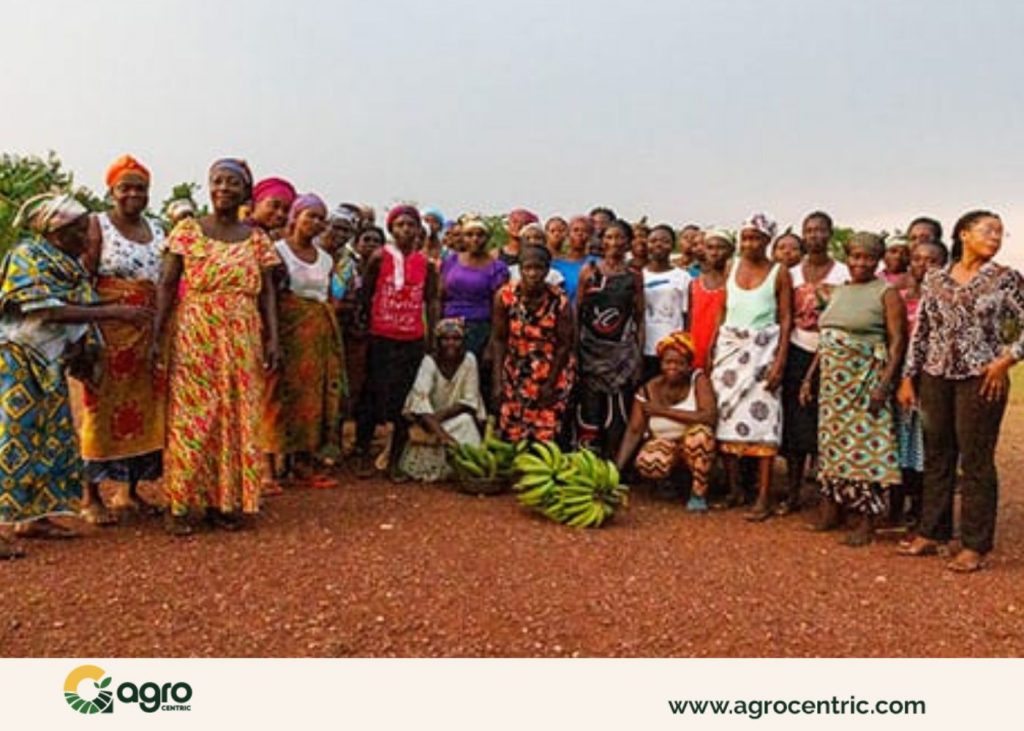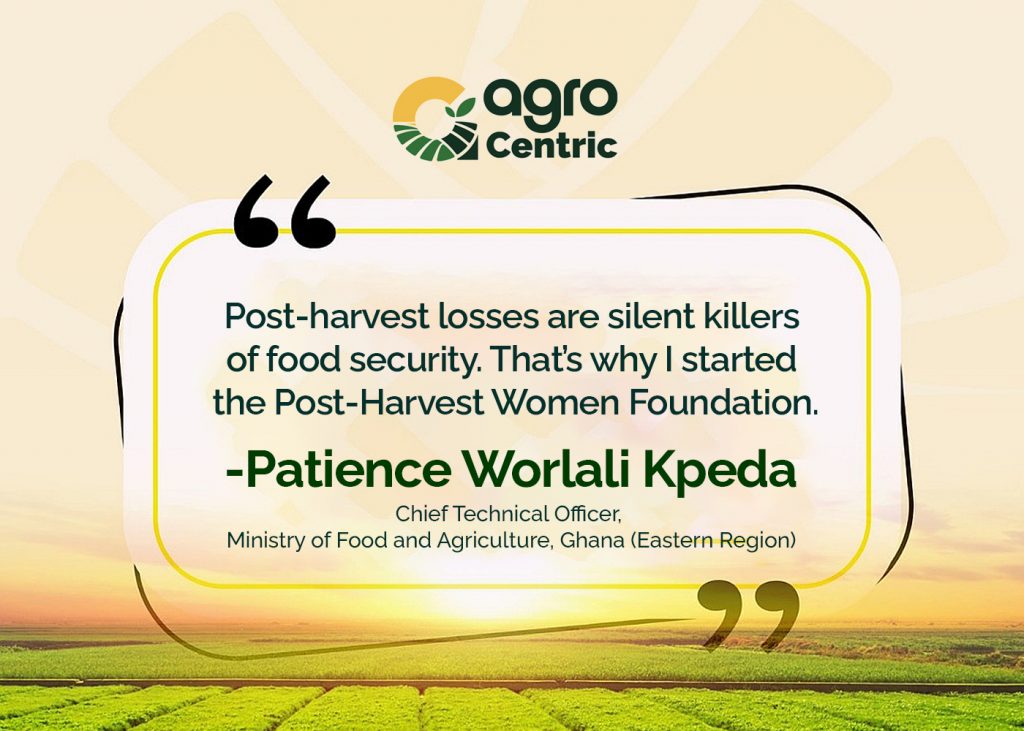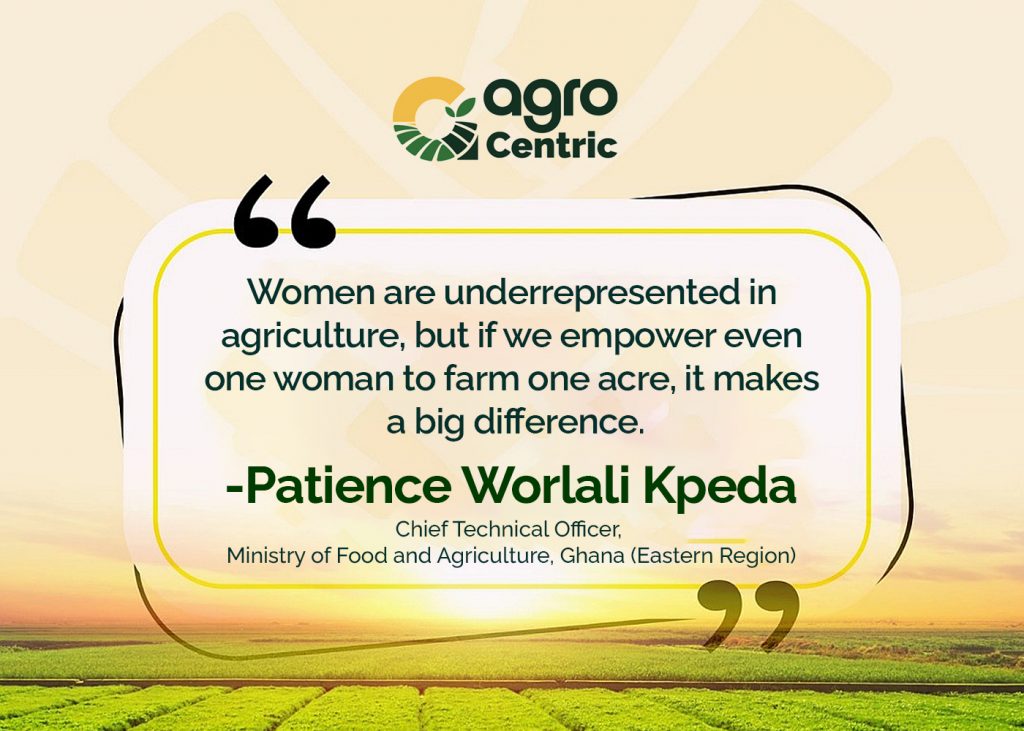
For many, farming is survival. For Patience Kpeda, it’s a lifelong calling. Raised in a small Ghanaian village, she turned childhood days climbing mountains to farm with her mother into a powerful mission: helping women farmers protect their harvests and secure their futures.
Currently, Patience holds the position of Chief Technical Officer at the Ministry of Food and Agriculture in Ghana’s Eastern Region and directs the Post-Harvest Women Foundation, an initiative that empowers rural women with technology, education, and determination. She is also Ghana’s Representative and Chapter Leader for Tammy’s International Women’s Empowerment in Agriculture Association (TIWAEA Africa Ghana) and the Technical Advisor for the Centre for Sustainability and Environmental Action. Her post-harvest management, climate resilience, and food security work advances agriculture in West Africa.
In this AgroCentric conversation, she reflects on her journey, the hurdles, the breakthroughs, and the quiet revolutions transforming Ghana’s farmlands.
Hello, Patience. Please tell us a bit about yourself.
I’m Patience Kpeda, a Ghanaian. I grew up in a village where farming was our main way of life. “Kpeda,” in my local language, means “a stone that cannot be cooked.” It reflects my nature: I’m strong and not easily broken.
I’m also a mother of two and have been in agriculture all my life. I attended an agricultural training college in Ghana, did my national service in a rural farming community, and even started my piggery before I joined the Department of Agriculture. I’ve been working with farmers for over a decade, and it’s been a deeply fulfilling journey.
How did agriculture become part of your story?
I followed my mum to the farm even as a little girl. Our farm was on a mountain, and we’d climb with foodstuffs on our heads.
So, agriculture wasn’t something you stumbled upon. You were born into it?
Absolutely. I’m the first of three girls, and I was always the one eager to follow my mum to the farm, even climbing hills to reach our mountain-top plots. I remember a bushfire that destroyed all our crops when I was eight. Standing at the mountain’s base, watching the fire, I felt something stir in me. That’s when I knew I wanted to do something meaningful in agriculture.
Were there ever moments you doubted your path?
When I finished senior high school, I wasn’t sure what would come next. I was just at home helping my mom on the farm. One day, my dad brought me a training college form and said, “You love agriculture, so go.” He handled everything, buying the form, preparing me for the interview, and supporting me till I got the admission. That day, I was so happy. I knew that was where I belonged.
At school, I gave my all. Every week, I won awards, including best hardworking student. I always made sure that if I was given a task, I completed it to the fullest. Agriculture is my passion.

Now you work as a Chief Technical Officer with Ghana’s Ministry of Agriculture (Eastern Region). What does that involve?
As an extension officer, my main role is to link farmers to market channels. We’re trained to bring innovations that enhance agriculture. We also lead demonstrations because we believe that’s the best way for farmers to learn and adopt climate-resilient practices.
We take farmers on food tours and farm visits so they can learn from others. I’m always online looking for innovations and technologies that they can adopt. Climate change is affecting everyone, not just Ghana and Nigeria. So, I also conduct interviews and training to stay updated. This year, I’m one of three Ghanaians enrolled in the Ban Ki-moon Centre for Global Citizens (BKMC) Youth AgriChampions programme. We’re learning about agroecology and how to integrate it into farming. One thing about me: I always want to be impactful. When I impact a farmer, especially a woman, I know that what ends up on my plate is healthy. That’s why I’m passionate about this work.
Why women, especially? Is the focus primarily on women farmers?
This is one question I’m usually careful with. But to be honest, women are underrepresented in agriculture. If a male farmer has five hectares of okra and a woman has just two, her contribution still adds to the country’s food supply. We shouldn’t leave women behind. We should also empower them to contribute. It helps reduce food insecurity.
In Africa, many women just help their husbands on farms or do some trading. But very few own land or run farms themselves. If we can empower a woman to farm just one or two acres, it can make a big difference. That’s why everything I do is rooted in women’s empowerment. We’re not trying to compete with men but to complement the system. Women can, and should, contribute more to food security.

Is that why you founded the Post-Harvest Women Foundation?
Yes, there’s a story behind that. In my career, I noticed traders and farmers constantly arguing. Farmers would complain, “I harvested this much but lost most of it.” I realised there’s a huge gap in post-harvest losses.
When a farmer smiles, I smile. If you go to the market in Nigeria and there’s plenty of food you can afford, you’re happy. But when there’s waste and prices shoot up, nobody’s happy. That’s why I created the Post-Harvest Women Foundation. Since grains like rice, beans, and maize are staples here, we decided to focus on them.
We started using hermetic storage bags, airtight bags that keep grains safe for up to two years. I began distributing them to women. You’ll agree with me: mostly women do the harvesting and drying. So we formed a registered foundation and started distributing the bags for free, one hermetic bag per farmer.
We also train them on proper drying techniques. Moisture content is key. When grains aren’t dried well, they can develop aflatoxins, dangerous moulds. We teach them how to avoid that. It’s a full chain, from harvesting to storage, and when I hear someone say, “My grains spoiled,” I get upset. We’ve put measures in place. So let’s use them.
Have there been success stories?
So many! But what makes me proud is when we go for monitoring and hear a woman say, “Madam, thank you. I never knew about aflatoxins. I used to feed that grain to my livestock, and we ate some too.” I tell them, “That livestock meat you’re eating came from bad feed!”
Now, these women know better. They dry their maize properly, store it in bags, and avoid traditional storage methods like heaping grain under trampolines. The impact is real. They’ve adapted and are seeing the difference. That’s what keeps me going.

Beyond post-harvest losses, what other projects are you running?
Yes, quite a few. First is the “One Farmer, One Hermetic Bag” project, which is still ongoing. We believe that every farmer should have this storage solution. Then I partnered with Tammy’s International Women in Agriculture Empowerment Association, based in Oklahoma, under the National Women in Agriculture Association. I’m proud to be the first Ghanaian to establish and incorporate this association in Ghana. We run quarterly programmes, and when there’s funding, we support women.
There’s also the Women in Home Garden project, where we give women organic seedlings to start their backyard gardens and train them to plant and maintain their plants. We collaborate with the University of Ghana to take women farmers to research centres to learn about innovations like biochar, a soil amendment technology. Also, with the Centre for Sustainability and Environmental Action, we support women in mushroom farming and climate change awareness.
Speaking of climate and sustainability, how do you see these practices transforming farming in Africa?
A lot has changed. Farmers are now using certified seeds and learning about plant spacing. Previously, people just threw seeds on the farm and hoped for the best. Now they understand population density and agroecology; crop rotation, water harvesting, and safe agrochemical use.
For instance, Ghana did not receive rain for four months last year. Farmers learned how to build small water dams to store rainwater through our interventions. Women also learned to use safer chemicals, especially since their bodies are more vulnerable. The narrative of farming is shifting slowly but surely.
What should policymakers be doing to help address these challenges?
One key thing: farmers need insurance. Many lose everything during a climate shock, like last year’s drought. If there’s a disaster, farmers should have somewhere to go. We need a national farmer’s insurance policy. Also, agro-inputs must be affordable. How can we expect food security if farmers can’t afford seeds or fertilisers at the right time? I’ve spoken about this with people in Nigeria and South Africa. We must keep pushing for real change.
USAID recently cut some agriculture funding. How did that affect your work?
It was a shock, but we didn’t put all our eggs in one basket. We have other partners: the University of Ghana, The Sustainability Centre, and Dr Tammy’s Foundation. Even though USAID support dropped, we still get some funding. I’m also constantly writing proposals and seeking new partners. We recently carried out a mushroom practical for women to help them diversify their income. It’s about being resilient and staying prepared.
With all this, how do you balance being a mum, a leader, and a fieldworker?
It’s challenging, no doubt. I have two children, and many roads to the farms are not motorable. So I ride a motorbike myself. I’ve even fallen off with my son. But when I’m with the farmers, I forget everything else, even to cook! My husband jokes about it. He says, “You forgot to cook today.” And I say, “Oh! I was talking to farmers all day.”
That’s the passion. When I see a farmer under the sun, weeding, it pushes me. Where will I get my tomatoes or corn if I give up on them? So, no matter how hard it gets, I keep going.

What other challenges do women farmers face, especially in Ghana?
Balancing farm work with family life is tough. That’s why we also teach them entrepreneurship skills, like soap making, cassava and oil palm processing, and more. Last year, we partnered with the Cosmos Innovation Centre to train women in washing powder production. Farming alone doesn’t always give enough income, so we help them diversify. Young school dropouts have come through our programmes, gained skills, returned to school, and are thriving. That’s the impact.
You recently received a bronze award from Global Sustainability Futures. What has that meant for your work?
It’s opened many doors. These awards are not just for show; they create opportunities for more collaboration. In 2016, I was named Best Extension Officer in my work at the Ministry of Agriculture in Ghana. I have recently joined platforms and programmes by organisations like Planet Women and the Ban Ki-moon Centre for Global Citizens. Through these recognitions, my visibility has grown. My presence and regular engagement with other professionals on LinkedIn have also helped me connect with more people.
What leadership advice do you have for young changemakers?
Agriculture is a passion. Don’t see it as an old man’s job. Seek opportunities, and they will find you. Don’t sit back waiting for someone to help you. Volunteer. Contribute. Make yourself visible online.
The agriculture value chain is vast; you can be a farmer, processor, marketer, or input dealer. There are grants and pitch competitions everywhere. We’re planning a school tour soon with the Post Harvest Women Foundation to teach students that farming isn’t just manual labour. You can be anywhere in the chain and still make an impact.
What do you hope to see change in agriculture over the next decade?
I want to see post-harvest losses reduced to zero. What’s the use of farming if your yield gets wasted? We need to preserve everything that’s harvested. I’m also part of Post Harvest Foundation Education with Dr Kinoa, and we’re creating learning platforms to share more solutions.
How can platforms like AgroCentric Africa help?
Amplify our stories, highlight grassroots efforts, and open doors for collaboration and funding. Help us show the world that African agriculture isn’t a pity party; it’s power, growth, and transformation.
Thank you, Patience, for your time and for sharing your story with AgroCentric Africa.
Thank you. And yes, you should start a home garden. Let’s farm something, even if it’s just one okra in a bucket.
Definitely! You can connect with Patience on LinkedIn and gain further insight into her work at the Post-Harvest Women Foundation.